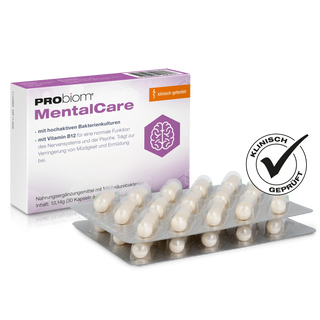Diverticulitis is a disease of the colon in which small protrusions in the intestinal wall – called diverticula – become inflamed. What many people don't realize, however, is that in addition to physical symptoms such as pain, bloating, and digestive problems, the disease can also have a significant impact on the psyche – and vice versa. In this article, we explore the interrelationship between the gut and the mind and demonstrate ways to holistically address diverticulitis.
What is diverticulitis?
Diverticula typically develop in the sigmoid colon due to protrusion of the mucosa and submucosa through muscular gaps in the intestinal wall. This diverticulosis often remains asymptomatic, but can progress to acute or chronic recurrent diverticulitis in the event of bacterial or mechanical irritation.
Typical symptoms of acute diverticulitis include pain in the left lower abdomen, fever, leukocytosis, and stool changes. In complicated cases, perforations, abscesses, fistulas, or stenosis may occur. Treatment ranges from conservative drug therapy to surgical repair.
The gut-brain axis: communication between the gut and the head
The human gut has an autonomously functioning nervous system – the enteric nervous system (ENS) – that is closely interconnected with the central nervous system (CNS). A continuous exchange of information takes place via the so-called gut-brain axis, mediated both neuronally (via the vagus nerve), and hormonally and immunologically.
Psychological stressors such as chronic stress, anxiety disorders, or depressive illnesses affect the gastrointestinal system through the activation of the hypothalamic-pituitary-adrenal (HPA) axis and the release of stress hormones such as cortisol. These can weaken the intestinal barrier, alter intestinal motility, and increase pro-inflammatory processes—a risk factor for the development and exacerbation of diverticulitis.
Psychological consequences of diverticulitis
The recurring symptoms and limitations associated with chronic diverticulitis, in turn, have a detrimental impact on mental health. Those affected often report fear of eating, social isolation, helplessness, and a reduced quality of life. Depression or anxiety disorders often develop in the context of the disease.
In addition, increased visceral pain sensitivity (hyperalgesia), promoted by psychological stressors, can exacerbate the subjective perception of symptoms without any objective worsening of the organic findings. This overlap with functional gastrointestinal disorders – such as irritable bowel syndrome – complicates diagnosis and treatment.
Holistic therapy approaches
Successful treatment of diverticulitis should not be limited exclusively to anti-inflammatory and antibiotic therapy. The psychological component should also be identified early and integrated into the treatment.
The recommended measures include:
-
Psychotherapeutic interventions , especially in cases of accompanying anxiety or depressive symptoms
-
Stress reduction techniques such as mindfulness, meditation, progressive muscle relaxation or yoga
-
Behavioral health support to identify and change disease-promoting thought and behavior patterns
-
Nutritional advice on switching to a high-fiber, anti-inflammatory diet
-
Exercise therapy to promote intestinal motility and reduce psychological tension
Targeted modulation of the microbiome through pre- and probiotic strategies can also be supportive, as the intestinal microbiome has been shown to influence both immunological processes and psychological stability.
Conclusion
Diverticulitis is not merely a local inflammation of the intestine, but rather reflects a complex interplay between gastrointestinal, immunological, and psychological factors. Considering the bidirectional gut-brain communication is essential for a comprehensive understanding and sustainable treatment of the disease.
An interdisciplinary approach that combines gastroenterological, nutritional, and psychosomatic components forms the basis of patient-centered therapy. Only in this way can both physical and mental stress be reduced and the quality of life of those affected be sustainably improved.













